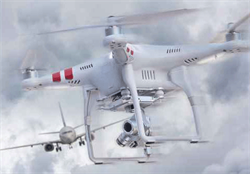2023 AIAA AVIATION Forum: AAM And Autonomy Written 17 April 2023
By AUVSI News
Written 17 April 2023
Originally published by AUVSI

In June, the American Institute of Aeronautics and Astronautics (AIAA) will host their annual AIAA AVIATION Forum. AIAA is the world’s largest aerospace professional society, and the 2023 AIAA AVIATION Forum is the only event that covers the entire integrated spectrum of aviation business, research, development, and technology.
AUVSI met with Jeremy Wang, an AAM expert, to learn more about the event’s programming around autonomy. Wang is the co-founder and COO of Ribbit, a venture-backed startup developing autonomous aircraft with the goal of improving e-commerce supply chains. Ribbit is credited with the first fully automated gate-to-gate flight in Canada and will soon be bringing commercial routes online in collaboration with regulators, communities, and customers.
Leaps Toward a New Age of Aviation
Wang explained that 2023 is a critical year to convene for discussions on AAM, noting: “What’s exciting right now is that we’re seeing proof that the technology to support eVTOL and autonomous flights is operationally ready.... We’re at a point where technologies have been initially validated, and now the question is how we integrate this into civilian airspace.”
Wang identified outdated regulations as a key challenge for reaching operationalization of AAM. As he explained, there is agreement that the starting point is flight with experimental permits and testing and the desired endpoint is a clear basis for certification processes – but the path in between is uncertain and challenging. In the early stages, some companies are focusing on autonomy for operations without passengers, such as cargo, aerial surveillance, and other missions in rural areas.
Regarding regulatory frameworks and U.S. aviation leadership, Wang said: “Entrepreneurs will go wherever opportunities take them. In fact, companies are looking to achieve airworthiness approvals in other regions and convert them over to the United States, which indicates there is a lack of good frameworks here.” He suggested that the industry work together to support the expansion of existing bilateral frameworks that can be converted to the United States to avoid duplicative regulatory work.
Wang has reason to be optimistic, adding: “One thing that’s exciting is the talk around Digital Flight Rules (DFR) being championed by NASA.” These rules recognize there are new technologies available for collision avoidance. NASA is soliciting feedback from the aviation industry, including from airports, ATC, and operators.
As he considers where autonomy is headed, Wang praised the industry collaboration taking place via standards communities, including RTCA and ASTM.
He also shared his hope that the small UAS and AAM communities will identify areas for increased collaboration, saying: “There can be a lot of benefit for both sides to take from each other on new standards and operational risk frameworks.”
Learn More at the 2023 AIAA AVIATION Forum
 Given recent advancements in autonomous technology and commercial aviation, Wang anticipates that the 2023 AIAA AVIATION Forum, 12–16 June, will be well-timed to provide informed perspectives on where AAM is going in the next 10–20 years.
Given recent advancements in autonomous technology and commercial aviation, Wang anticipates that the 2023 AIAA AVIATION Forum, 12–16 June, will be well-timed to provide informed perspectives on where AAM is going in the next 10–20 years.
The event will cover key topics on aviation and aeronautics, with Daily Forum Themes:
- Monday, 12 June: State of the Industry
- Tuesday, 13 June: Decarbonization & Sustainability
- Wednesday, 14 June: Advanced Air Mobility
- Thursday, 15 June: Aircraft Certification
- Friday, 16 June: Hypersonics & Supersonics
Why should AUVSI members attend?
- Over 1,700 technical presentations on the latest innovations spanning 20+ aviation and aeronautics research topics will be delivered.
- Speakers and panelists participating in the sessions are proven business leaders and innovators with their fingers on the pulse of the aviation industry.
- Over 2,000 participants from across the globe are expected, representing hundreds of government, academic, and private institutions.
Register Now for the event in San Diego (and available online).
About Jeremy Wang
 Jeremy Wang is the co-founder and COO of Ribbit, a venture-backed startup developing autonomous aircraft with the goal of improving e-commerce supply chains. Ribbit is credited with the first fully automated gate-to-gate flight in Canada and will soon be bringing commercial routes online in collaboration with regulators, communities, and customers. Prior to Ribbit, Jeremy was the CTO of Canada's top-ranked commercial drone operator where he oversaw the development of special-purpose drones for industrial and defense applications. Jeremy completed a BASc in Engineering Science from the University of Toronto and PhD in Mechanical and Mechatronics Engineering from the University of Waterloo.
Jeremy Wang is the co-founder and COO of Ribbit, a venture-backed startup developing autonomous aircraft with the goal of improving e-commerce supply chains. Ribbit is credited with the first fully automated gate-to-gate flight in Canada and will soon be bringing commercial routes online in collaboration with regulators, communities, and customers. Prior to Ribbit, Jeremy was the CTO of Canada's top-ranked commercial drone operator where he oversaw the development of special-purpose drones for industrial and defense applications. Jeremy completed a BASc in Engineering Science from the University of Toronto and PhD in Mechanical and Mechatronics Engineering from the University of Waterloo.
